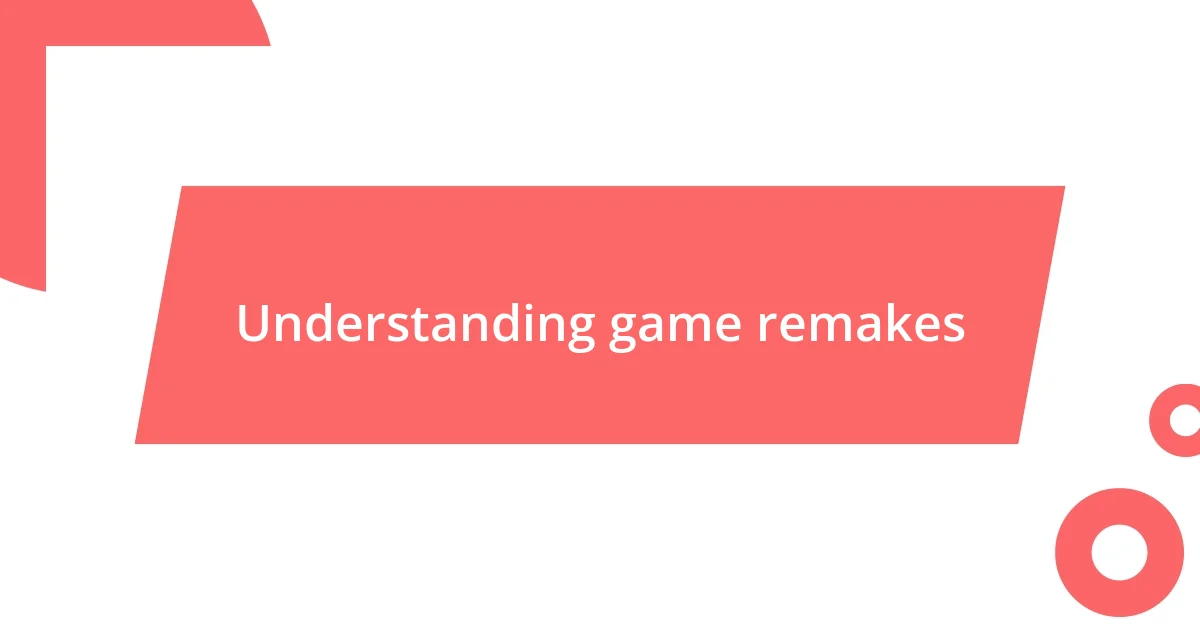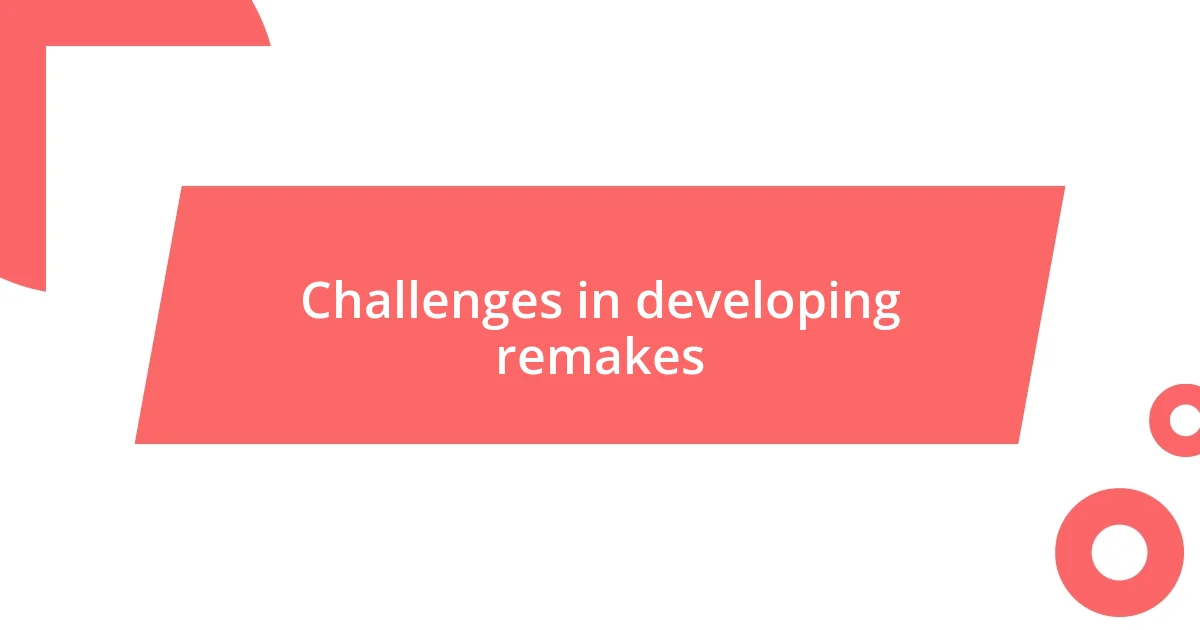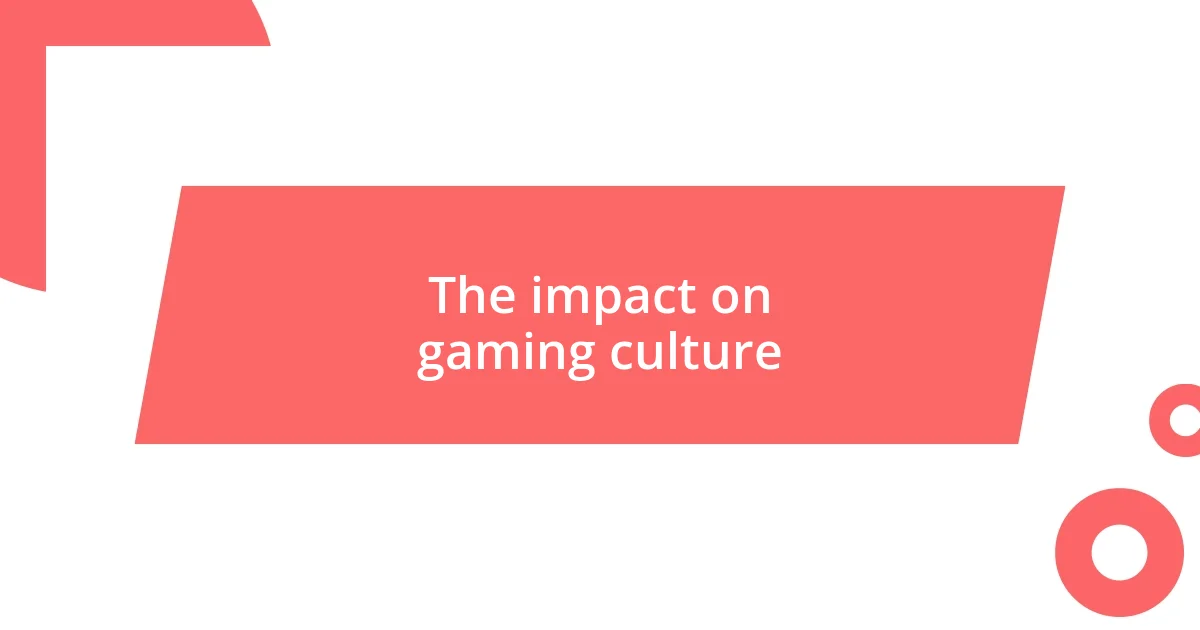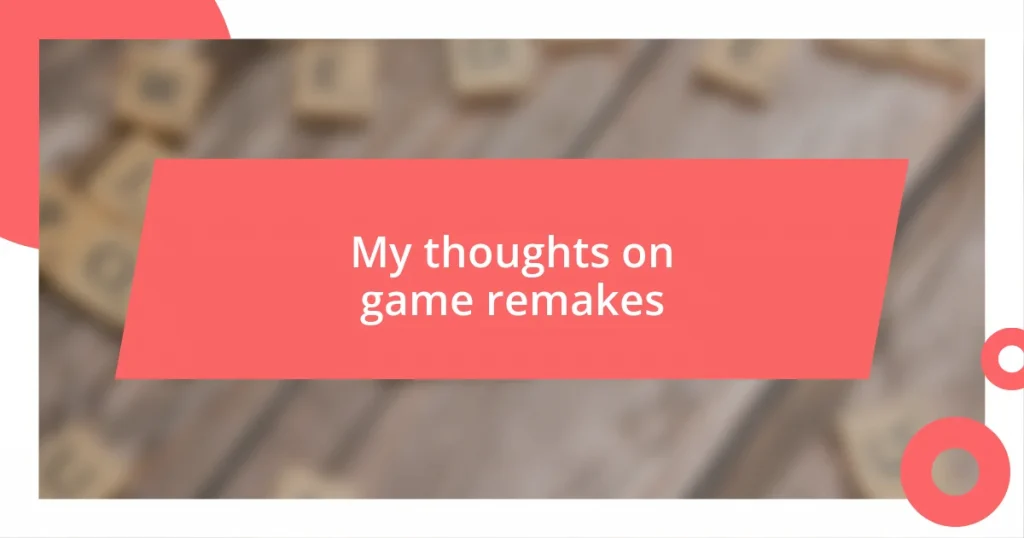Key takeaways:
- Game remakes create emotional connections and bridge generations, providing updated graphics and mechanics while retaining nostalgic elements.
- Challenges in developing remakes include balancing nostalgia with modern expectations and addressing diverse audience expectations without alienating fans.
- Future trends may include VR remakes, narrative-driven updates expanding storylines, and increased community involvement in the development process.

Understanding game remakes
When I think about game remakes, I get a rush of nostalgia and excitement. There’s something magical about revisiting a beloved title from my past, especially when it’s been given a fresh coat of paint. I often wonder, what is it that draws us back to these games? Is it the comfort of familiar characters and storylines, or the anticipation of experiencing them with updated graphics and mechanics?
Game remakes serve a unique purpose: they bridge the gap between generations of gamers. I remember playing a classic that had been remade, feeling both a sense of warmth and trepidation. Would it live up to my memories? The thoughtful enhancements often breathe new life into gameplay, allowing both new and returning players to connect in ways that resonate today.
The emotional impact can be profound. For example, I was thrilled to see my favorite childhood game reimagined, but it also made me reflect on how much I’ve grown since playing it. Isn’t it fascinating how the same story can evoke different feelings at different stages of our lives? This duality highlights the importance of context in storytelling and gaming alike.

Reasons for game remakes
Game remakes often arise from a desire to update outdated elements, ensuring they resonate with modern players. I remember a time when I revisited a classic game that had great gameplay but subpar graphics; it felt like stepping back into a time capsule. However, seeing it remade with lush visuals and smoother mechanics was like meeting an old friend with a new outlook on life. These enhancements not only attract long-time fans but also invite new players into the fold, making the experience richer for everyone involved.
Here are key reasons why game remakes are becoming more popular:
- Nostalgia: Remakes tap into the emotional connections we have with original titles, recalling fond memories.
- Accessibility: Updated games can cater to players who might find older mechanics too challenging or cumbersome.
- Technological advancements: Improved graphics and sound allow developers to enhance storytelling and immersion.
- Wider audience reach: A fresh take on classic games can bring in new fans who are curious about the story but were not around during the original’s release.
- Cultural relevance: Updating themes or storylines can make classic narratives resonate with contemporary values.

Benefits of game remakes
There’s nothing quite like experiencing a game remake that not only retains the essence of the original but also introduces innovative gameplay mechanics. I remember diving into a recent remake and marveling at how the controls felt so much more intuitive. It made me think: wouldn’t it be amazing if all classic games received this kind of thoughtful upgrade? Such enhancements can vastly improve the overall experience, making it more accessible to a broader audience while keeping the nostalgia alive.
Visually appealing remakes allow them to reach new heights, effectively capturing attention and sparking interest in younger generations. In my experience, I’ve shared remade titles with younger relatives who never had the chance to enjoy the originals. Their excitement was palpable as they explored these revamped worlds. It’s fascinating how a fresh design can create new fans out of those who were previously unaware of a game’s legacy, solidifying its place in the ever-evolving gaming landscape.
Another remarkable benefit is how remakes often serve as a creative canvas for developers. They can expand on the original story, adding fresh twists or addressing plot points that needed more depth. I’ve found that experiencing remakes with enhanced narratives allows me to connect with the characters on a different level. For instance, I was captivated by the expanded backstory of a once one-dimensional character, which brought a new layer of emotional depth that deeply resonated with me.
| Benefit | Explanation |
|---|---|
| Enhanced Gameplay | Updated mechanics improve accessibility and enjoyment for players. |
| Visual Appeal | Modern graphics attract new fans and keep nostalgia alive. |
| Creative Freedom | Developers can expand stories and enrich character arcs, offering a new experience. |

Challenges in developing remakes
As I think about the challenges in developing remakes, one major hurdle stands out—balancing nostalgia with modern expectations. I recall playing a beloved classic that was remade but felt a bit off; while the graphics dazzled me, the essence of the original experience was lost in translation. This makes me wonder: how do developers keep the original spirit alive while upgrading so many aspects?
Another challenge lies in the technical limitations and advancements that remaking a game entails. I’ve seen studios struggle with incorporating new technology without losing the unique feel of a classic game. For example, when playing a remake where the controls were overly complicated, I found myself longing for the simplicity of the original. It’s a tricky tightrope to walk, and sometimes it feels like developers must choose between innovative mechanics and maintaining that cherished familiarity.
Lastly, there’s the issue of audience expectation. Having experienced some remakes, I often feel a mix of excitement and dread. What if they don’t get it right? I remember sharing my anticipation for a remake with friends, and we all had different ideas about what should be included or changed. This diversity of opinions can create pressure on developers to meet everyone’s expectations, which seems nearly impossible. How do they satisfy both longtime fans and newcomers without alienating one group? It’s just one of those puzzles that make game remaking a fascinating but demanding endeavor.

Notable successful game remakes
When I think of notable successful game remakes, the first title that comes to mind is “Resident Evil 2.” The way it transformed the original survival horror experience blown me away. I remember playing it late at night, jumping at every sound, and realizing how the updated graphics and mechanics brought a freshness to the aged formula. How incredible is it that a game from the late ’90s could evoke that level of fear and excitement in a modern context?
Another standout is “The Legend of Zelda: Link’s Awakening.” This whimsical remake not only stayed true to the original’s charming essence but added a beautiful art style that felt like stepping into a storybook. I became lost in its enchanting world, rediscovering old puzzles and secrets while admiring the vibrant graphics. It made me reflect on how nostalgia can be beautifully packaged, offering a new layer of enjoyment without stripping away the beloved elements that make the original so special.
Moreover, “Final Fantasy VII Remake” truly captivated me with its ambitious reimagining. The way it expanded the story and its characters touched my heart in ways I hadn’t anticipated. I fondly remember my first encounter with the revamped combat system; it was exhilarating and engaging. Can a remake truly redefine a classic, or is it merely a shadow of the original? In this case, I’d argue it succeeded brilliantly, proving that remakes can deepen our connection to stories we thought we already knew inside and out.

The impact on gaming culture
The impact of game remakes on gaming culture is profound, shifting how we perceive and connect with our favorite titles. I often find myself chatting with friends about how remakes create a bridge between generations of gamers. For instance, when I played a remake with a friend new to the series, it was fascinating to see their fresh perspective while I was enveloped in nostalgia. How unique is it that these remakes can spark conversations and foster connections among players of all ages?
Interestingly, remakes also ignite debates about originality versus homage in gaming culture. I’ve been in heated discussions where we’ve dissected whether a remake can stand on its own merit or if it’s merely leaning on the shoulders of its predecessor. One instance that stood out to me was when a remake included updated mechanics that sparked a lively debate about whether it improved the experience or strayed too far from the original. It made me question: does innovation dilute the essence of a cherished classic, or does it enhance our appreciation of what came before?
Moreover, I’ve noticed that remakes can reignite interest in entire franchises, bringing not just new players but also veterans back into the fold. For example, when a beloved title was remade recently, I felt compelled to revisit the original. The surge of online discussions, fan theories, and community creations reminded me of the vibrant culture that surrounds these games. This revival creates a sense of belonging and excitement, proving that remakes can be more than just iterations; they can redefine cultural touchstones within the gaming landscape.

Future trends in game remakes
It’s fascinating to contemplate the future trends in game remakes, especially with advancements in technology. I can almost envision a time when virtual reality remakes become the norm, allowing players to immerse themselves in their favorite worlds like never before. Wouldn’t it be exhilarating to physically step into a classic dungeon or battle alongside iconic characters?
Another trend I anticipate is the rise of narrative-driven remakes. These will not only refresh the visuals but also expand storylines and character development. I remember how “Final Fantasy VII Remake” surprised me with its depth; I wonder how future titles will push these boundaries even further. This leads me to consider: will remakes eventually tell new stories inspired by the originals, or is this the evolution of storytelling in gaming?
Lastly, the community’s involvement in game remakes is likely to grow. With the increase in crowdfunding and fan input, I see a future where players actively shape the remakes they want to see. I’ve often thought about how empowering it would be to have a say in a beloved series’ revival. Will this level of engagement forge a stronger connection between developers and gamers, or could it risk diluting the artistic vision? Engaging with our favorite franchises in such a collaborative way could redefine our gaming experiences.













